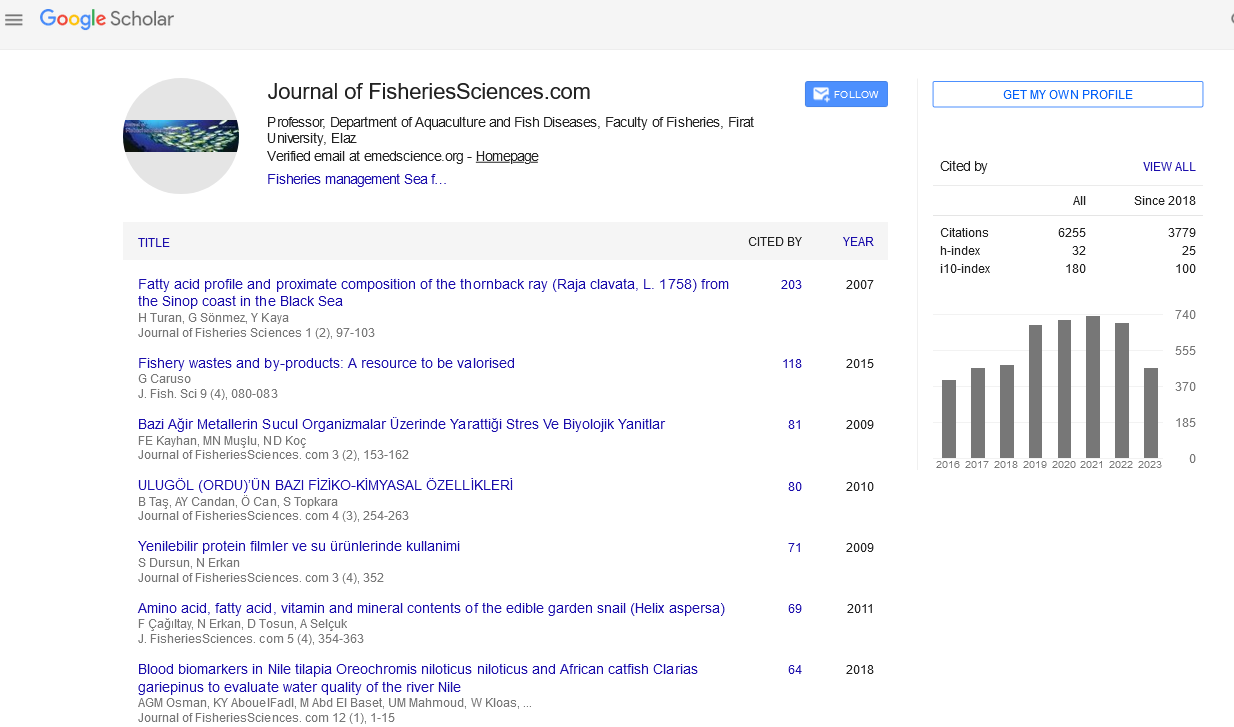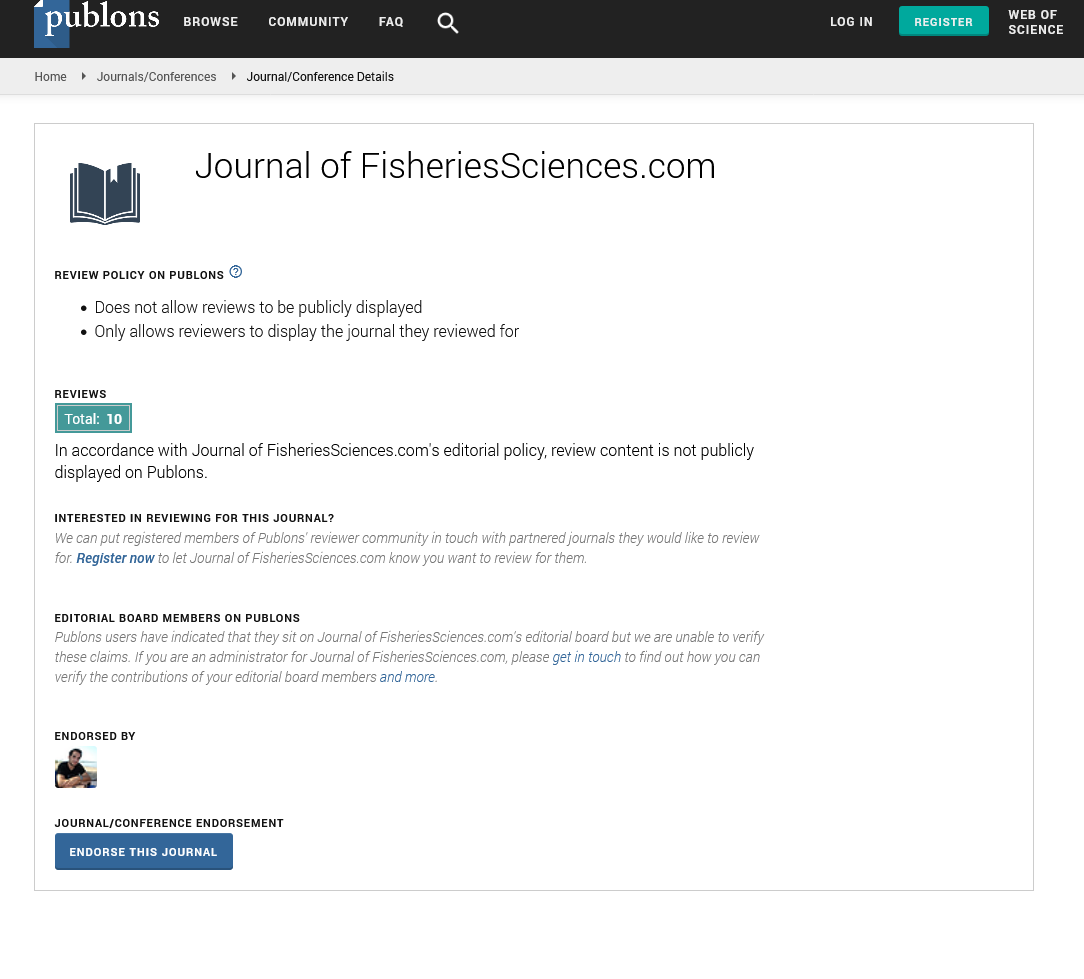Commentary Article - (2022) Volume 16, Issue 7
Impacts of fishing management on target species.
Obinna Musa*
Department of Microbiology, University of Nigeria, Nigeria
*Correspondence:
Obinna Musa, Department of Microbiology, University of Nigeria,
Nigeria,
Email:
Received: 01-Jul-2022, Manuscript No. ipfs-22-11598;
Editor assigned: 04-Jul-2022, Pre QC No. ipfs-22-11598 (PQ);
Reviewed: 19-Jul-2022, QC No. ipfs-22-11598;
Revised: 23-Jul-2022, Manuscript No. ipfs-22-11598 (R);
Published:
30-Jul-2022, DOI: 10.36648/1307- 234X.22.16.100
Abstract
The design, operation, and performance of fisheries management systems around the world vary widely. There is diversity in management institutions, strategies, and tactics across different geographies, fishing fleets, and taxonomic groups. It is uncertain which individual management elements have the greatest influence on the status of fished populations, as well as which external factors influence the overall success of fisheries management systems, on a global scale. We employed expert surveys to characterise the management systems of 28 major fishing nations based on species, and we investigated the influence of economic, geographic, and fishery-related factors [1]. Science-based catch or effort restrictions are vital for successful fisheries management, and monetary investment in fisheries can benefit management objectives when used to control fishing pressure rather than increase fishing capacity. Countries with less effective management systems today have the greatest opportunity to enhance long-term stock status outcomes and should be the focus of global efforts to improve fisheries management.
Introduction
Recent research has yielded a variety of opinions on the status
of marine populations, as well as recommendations for how the
world's fisheries should be managed. Although scientists agree
that stronger management is required, some proposed solutions
include widespread establishment of marine reserves, whereas
others involve greater investment in management structures,
such as stock assessments and implementing catch or effort
limits, or reforming fishing fleets to a rights-based management
approach [2]. We used expert surveys to assess components of
fisheries management systems such as research, management,
enforcement, and socioeconomics in 28 major fishing countries
that account for more than 80% of total catch globally [3]. We
developed survey criteria to see if these qualities help to reduce
fishing pressure on target species. Countries with less effective
management systems today have the greatest opportunity to
enhance long-term stock status outcomes and should be the
focus of global efforts to improve fisheries management. Recent
research have yielded a variety of opinions on the status of
marine populations, as well as recommendations for how the
world's fisheries should be managed.
Although scientists generally agree that stronger management is required, some proposed solutions include widespread
establishment of marine reserves, whereas others involve greater
investment in management structures, such as stock assessments
and a right-based approach to management of fishing fleets,
including enforcement of catch limits and effort limits. We used
expert surveys to assess components of fisheries management
systems such as research, management, enforcement, and
socioeconomics in 28 major fishing countries that account for
more than 80% of total catch globally [4]. Of the four stock status
variables studied, the trend in fishing mortality may be the best
predictor of future stock status. The level of transparency and
stakeholder involvement in the management process, as well as
the absence of capacity-enhancing subsidies, were found to be
positively connected to fishing pressure trends [5]. This finding
backs up previous research by demonstrating that increasing
stakeholder engagement within governance frameworks can
improve sustainable harvesting results for targeted species. The
observed differences between studies are attributed, in part, to
the variety of factors considered in each overall assessment. Our
survey criteria focused primarily on target species, whereas EBFM
criteria focused on ecosystem-level values, structure, function,
and change [6]. Some criteria (fishery management plan, key
habitat protection, community involvement) were investigated in both studies, but others were only examined in one or the other
depending on overall focus [7]. Some of our requirements fall into
other categories [8]. Three management variables were highly
relevant in evaluating whether stock size and fishing mortality are
now in or progressing toward ideal states: the breadth of stock
assessments, the strength of fishing pressure limitations, and the
breadth of enforcement programmes [9]. These findings support
the premise that science-based catch or effort restrictions are
crucial to successful fisheries management, and if monetary
investment is used to control fishing pressure rather than increase
fisheries capacity, it will help to achieve management objectives.
Countries with less effective management systems today have
the greatest opportunity to enhance long-term stock status
outcomes and should be the focus of global efforts to improve
fisheries management [10].
Conclusion
Climate change will have a wide range of effects on maritime
ecosystems and resources. Previous forecasts that climate
change could diminish world fisheries earnings by up to $10
billion per year compared to today drew a lot of attention.
Taking human responses into consideration, on the other hand,
changes our perspective on climate change and the world's
waters. We show that the future of global fisheries could be more
lucrative than today, but only if management reforms addressing
present mismanagement and looming climate change issues
are implemented across a wide range of fisheries in the near
future. This is true internationally as well as for over half of the
individual equities examined. These findings show that climate
change will force global fisheries to a critical juncture in the
coming decades. Either we respond to the issues proactively with
effective management, or we risk undoing the tremendous gains
accomplished in some countries and further decimating fisheries
in nations that have not yet implemented strong fishery reforms.
REFERENCES
- Worm Boris (2006) Impacts of Biodiversity Loss on Ocean Ecosystem Services. Science 314: 787-790.
Google Scholar, Crossref, Indexed at
- Michael Clark, Tilman David (2014) Global diets link environmental sustainability and human health. Nature. 515: 518-522.
Google Scholar, Crossref
- Jennings Simon, Kaiser Michel J (1998) the effects of fishing on marine ecosystems (PDF). Advances in Marine Biology 34: 201-352.
Google Scholar, Crossref
- Daskalov Georgi M, Grishin Alexander N, Rodionov Sergei, Mihneva Vesselina (2007) trophic cascades triggered by overfishing reveal possible mechanisms of ecosystem regime shifts. Proceedings of the National Academy of Sciences 104: 10518-10523.
Google Scholar, Crossref, Indexed at
- Cooke Steven J, Suski Cory D (2005) Do we need species-specific guidelines for catch-and-release recreational angling to effectively conserve diverse fishery resources? Biodiversity & Conservation 14: 1195-1209.
Google Scholar, Crossref, Indexed at
- Coleman Felicia C, Williams Susan L (2002) Overexploiting marine ecosystem engineers: potential consequences for biodiversity. Trends in Ecology & Evolution 17: 40-44.
Google Scholar, Crossref, Indexed at
- Cury Bakun, Crawford Jarre, Quinones Shannon, Verheye (2000) Small pelagics in upwelling systems: patterns of interaction and structural changes in wasp-waist ecosystems. ICES Journal of Marine Science 57: 603-618.
Google Scholar, Crossref, Indexed at
- Aburto-Oropeza Octavio, Erisman Brad Galland Grantly R, Mascareñas-Osorio Ismael, Sala Enric, Ezcurra Exequiel (2011) Large Recovery of Fish Biomass in a No-Take Marine Reserve. PLOS ONE 6: 23601.
Google Scholar, Cross ref, Indexed at
- Pikitch Ellen K (2012) the Risks of Overfishing. Science 338: 474-475.
Google Scholar, Crossref
- Bartholomew Aaron, Bohnsack James A (2005) A Review of Catch-and-Release Angling Mortality with Implications for No-take Reserves. Reviews in Fish Biology and Fisheries 15: 129-154.
Google Scholar, Crossref, Indexed at






